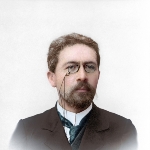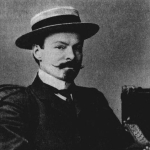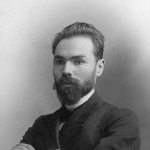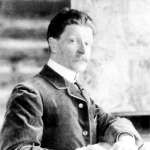Background
Jurgis Kazimirovich Baltrusaitis was born on April 20, 1873, in Jurbarkas, Taurages Apskritis, Lithuania. He was born to a family of farmers in Paantvardys village near Jurbarkas, which was then under Imperial Russian rule.

Kaunas gymnasium
Building "Aptekarskij dom" on Red Square that housed Moscow University.
Diplomat Political activist translator poet
Jurgis Kazimirovich Baltrusaitis was born on April 20, 1873, in Jurbarkas, Taurages Apskritis, Lithuania. He was born to a family of farmers in Paantvardys village near Jurbarkas, which was then under Imperial Russian rule.
In 1885, Jurgis Kazimirovich entered Kaunas gymnasium and graduated in 1893. He then entered the Faculty of Physical and Mathematical Sciences at Moscow University (now Moscow State University). At the same time, he attended lectures in the Faculty of History and Philology and studied foreign languages.
From 1895 onwards, Jurgis Kazimirovich began to take part in editing Moscow-based literary magazines, and he began his own creative work in Russian. He joined the Symbolist movement, and, in association with Sergei Polyakov, set up the publishing house Scorpio, which published the chief Russian Symbolist magazines such as Vesy and Severnyie Tzvety as well as collections of the greatest Russian Symbolist poets. A member of the city's cultural elite, Jurgis Kazimirovich was a close friend and colleague of such famous Russian writers and artists as Anton Chekhov, Konstantin Bal'mont, Valery Bryusov, Vyacheslav Ivanov, Maksim Gorky, Konstantin Stanislavsky, Mikhail Vrubel and Aleksandr Scriabin; Boris Pasternak was the private home tutor of Baltrushaitis's children.
After Lithuania regained independence in 1918, Jurgis Kazimirovich was appointed Lithuanian ambassador to Russia in 1920 and held this position until 1939. In 1932 he was honored with a doctorate by Vytautas Magnus University in Kaunas. In 1939, Jurgis Kazimirovich was appointed a counselor of the Lithuanian embassy in Paris.
Jurgis Kazimirovich published three collections of poetry in Russian and another three in Lithuanian. He authored many Russian translations of modern literature, including ones from Henrik Ibsen, Oscar Wilde, August Strindberg, Knut Hamsun, and Gabriele D'Annunzio. His translation of Hunger by Hamsun is considered a classical rendering of this work into Russian and has been continuously republished right up to contemporary times.
Jurgis Kazimirovich learned 15 foreign languages during his life.
In August 1899, Jurgis Kazimirovich secretly married Maria Ivanovna Olovyanishnikova, a cousin of Elizabeth Alexandrovna Dyakonova (the author of The Diary of a Russian Woman).





